Every two years, AFSCME hosts an international convention for delegates from locals, councils and retiree chapters. At the International Convention resolutions are passed that guide actions AFSCME takes as a whole, and changes to the international constitution can be proposed.
While most members may be familiar with the call for delegates and the voting process, only a few have attended convention and experienced the ins and outs of participating in union democracy at a higher level. AFSCME’s 2024 convention was hosted in Los Angeles from August 10 – 16, 2024.
A few of the members who attended as delegates or alternates graciously agreed to be interviewed to paint a more detailed picture of what it’s like to participate in a convention. If you’re considering running for delegate, we hope this interview will help you decide if attending convention is a fruitful way for you to participate in the union.
Thank you to member Izabel Gronski for helping conduct this interview, and to members Ana Santoyo and Caroline Broeren who provided photos taken at the convention.
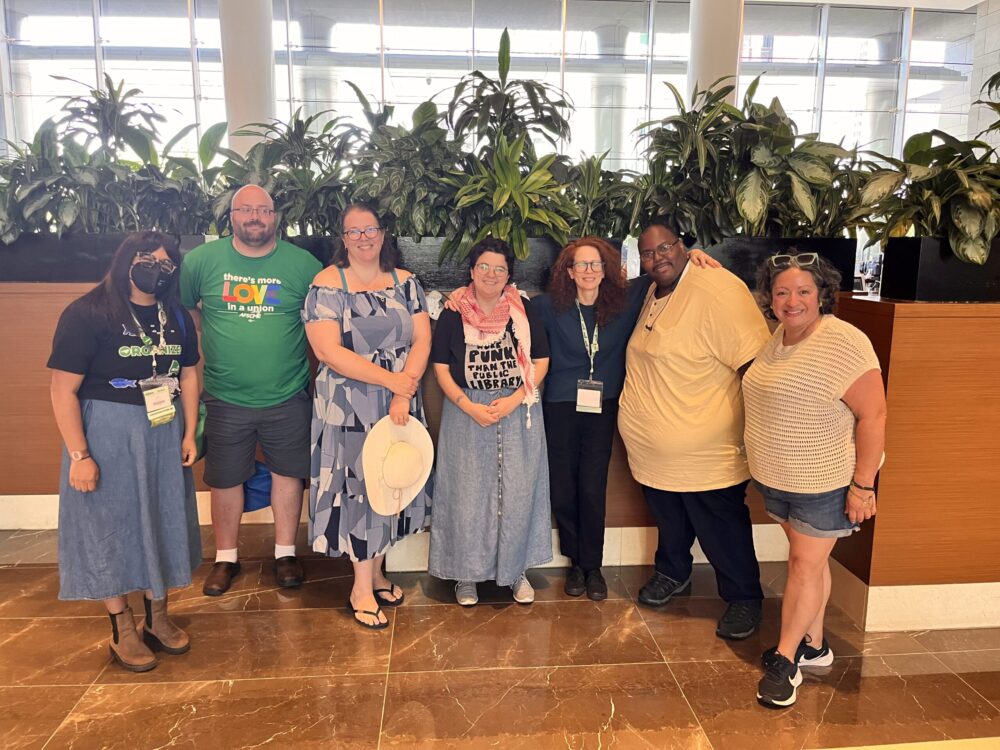
What was on your daily agenda for the convention?
Emma Ramirez: As an alternate, I did my best to attend as much as I could. I went to a round table, our council meeting, and sat in at most of the floor sessions. The only day I didn’t stay for the whole floor was when the convention crammed most of the amendments and resolutions into a single eight hour session with no lunch break. I would have loved to go to lots of workshops, especially since I couldn’t participate on the floor, but there were unfortunately only two time slots during the week for workshops.
Caroline Broeren: I attended all of the floor sessions, participated in workshops, and stopped by the exhibit booths for updated information, especially for daily actions from the political action booth. As an alternate, I wanted to participate as much as possible since I didn’t have a voting role.
Corina Pedraza: Convention has a full agenda almost every day. Some days we started at 7:30 am and didn’t end until after 6pm so you need stamina! On my daily agenda was attending all the floor sessions, getting to workshops, stopping by exhibit booths to gather new information and swag for our members, and attending social events to meet members from IL and across the country. I did look forward to downtime such as dinner with fellow delegates from our local and especially talking to library and other cultural workers from around the country who were experiencing similiar issues as us.
Adrienne Seely: My daily agenda varied with the convention schedule, but it went something like this: wake up; start messaging with fellow delegates and AFSCME members from across the country organizing to increase rank-and-file democracy in our union; distribute t-shirts to delegates at hotel; revise pamphlets and other lit to hand out to fellow delegates during the floor sessions and in-between; check talking points; print pamphlets at Kinkos; read convention rules; REREAD convention rules; grab breakfast; continue texting; go to convention hall; attend a workshop; meet up with fellow organizers to distribute lit and game plan outreach to different Councils and regions; gather with Local 1215 folks; hear presentations; read resolutions and amendments and vote on them; walk the hall and talk to folks; hand out literature on resolutions; gather at mics to support members speaking on resolutions for rank-and-file democracy, progressive efforts, and library causes; try to line up at mics to speak on resolutions; try to grab lunch between votes; text text text; break from convention business for the day.
Once the floor sessions wrapped up, I attended committee meetings or visited exhibits, and then regrouped with other organizers to plan next steps in organizing to pass progressive resolutions at convention. In the evening, there were events/dinners with fellow culture workers and Council 31 delegates, or free time to get much-needed rest for the next day.
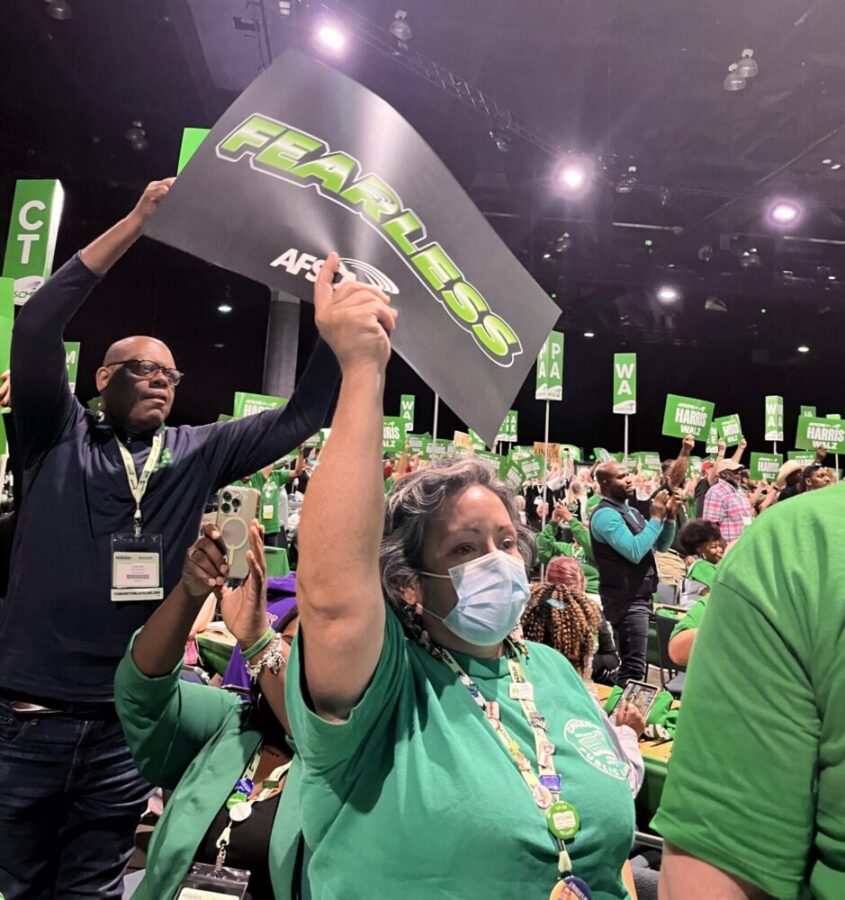
What was it like to use Robert’s Rules of Order with a big group?
Emma: They had a fancy setup with marshals running lights to mark who wanted to speak that seemed to flow quickly and smoothly. However, there didn’t appear to be any sort of stack system, so sometimes people would have their light on for the whole time and never get called on. I have concerns about using voice votes in such a large space, so I’m curious about ways technology could be utilized to more accurately reflect votes, especially delegates who are authorized to vote on behalf of locals not present.
Corina: Using RRO in a large setting is definitely challenging! I agree with Emma in that it was a challenge to figure out who would get called first, 2nd, etc. and it felt extremely outdated to have to yell your vote as loud as possible, especially if members were split on an issue. I too would be interested to see how we could use technology to vote during convention.
Adrienne: The convention uses Robert’s Rules of Order only for topics not addressed in the convention’s own official rules (which are set by the convention’s “Rules Committee”) or the International Constitution, so the experience is sort of akin to RRO seen in a funhouse mirror. As Emma mentioned, delegates vote on resolutions and amendments using a voice vote system—which basically means yelling “yes” or “no.” I definitely respect the enthusiasm expressed in voice voting–people do get really into it, trying to literally make their voices heard. But I have my doubts that this is the best or most accurate way to measure votes. People’s voices carry differently, due to all kinds of physiological differences, and I’m not sure that whether a resolution passes or not should be determined by who can yell the loudest. (I, for example, have asthma, and I can’t shout my way out of a paper bag!)
Did you attend any workshops? Please share one takeaway!
Emma: I attended a cultural workers round table. We talked about how Project 2025 would affect libraries; a lot of the fear focused on staff being punished for “obscene” materials. I pointed out that it would be really difficult to prosecute every single CPL employee, or even just all teen and children’s staff, so they would focus on the people who are most visibly queer and trans.
Caroline: I attended the following workshops:
- Solving Workplace Issues with Collective Action, which was a good reminder about using collective actions to solve issues that affect our members.
- You Can’t Do It Alone! Recruiting Activists to Build Stronger Locals, which reinforced the importance of connecting with our members to find out what matters to them and inviting them to get more involved in the union.
Adrienne: I attended the workshop on “Advanced Steward Training: Representing Members Facing Discipline.” My takeaway is that our Local’s steward team and our internal training is really top-notch. The workshop was a great refresher, but nothing beats talking to our expert lead stewards here in Local 1215.
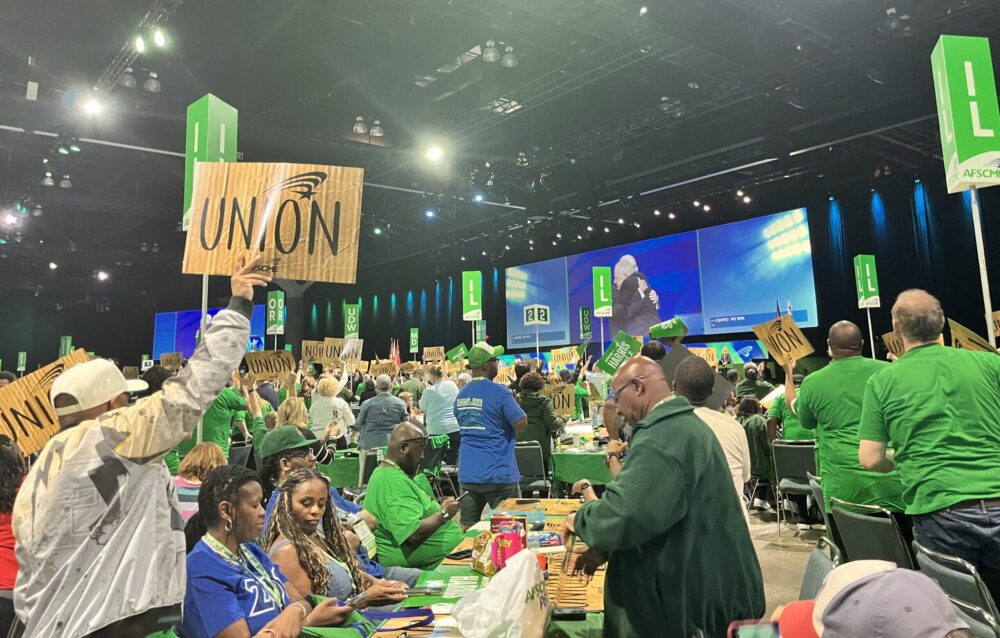
What role do committees play at convention? Did you attend any committee meetings?
Emma: I hadn’t arrived yet the day most of the committee meetings took place. As a union newbie, it was unclear and not communicated to me what they were for or if I’d be able to participate in them.
Adrienne: I attended several Resolutions Committee meetings. Like it says on the tin, the Resolutions Committee discusses resolutions sent in by members across the country, and makes decisions as to how they’ll be handled. Sometimes, for example, multiple resolutions are submitted that address the same topic, and the committee might decide to combine them into a single resolution for delegates to vote on. The committee might decide that a resolution requires substantial revision, or that it should be rejected or tabled and not considered whatsoever by the delegate body.
There are also resolutions submitted by the AFSCME International Executive Board for delegates’ consideration–these are not handled by the committee, and go directly to the floor for voting. But committees tackle a variety of tasks and concerns, from working on federal policy, to handling member appeals, to discussing updates and changes to the International constitution.
How can we submit resolutions? Why are resolutions important?
Emma: Even if a resolution fails, it can be a valuable way to get people talking about an issue. There were many folks who spoke to our contingent about how grateful they were for the resolutions submitted, even though they didn’t pass.
Adrienne: Resolutions are one of the primary ways that regular rank-and-file members can ask our union to align itself with a goal, an idea, or a policy priority at the national level. They’re sometimes more like statements of intention or of values than fully concrete plans of action, but for that very reason they’re incredibly important as a way for AFSCME members to express–to ourselves and the world–our values and our stances on issues.
When AFSCME workers wanted our union to help in the fight against apartheid in South Africa in 1984, members passed a resolution to do that. That same year, when members wanted to renew the fight for the Equal Rights Amendment, they submitted and passed a resolution. The 2024 convention’s resolutions addressed AFSCME International priorities such as fully funding transit systems, ending censorship in libraries, supporting climate change action and environmental justice, and many other topics.
As Emma mentioned, even if a resolution doesn’t pass or results in a divided vote, considering even the “controversial” resolutions on the convention floor ensures that we’re engaging in dialogue about all the issues we face together as workers, and can plant the seed for changes and for new priorities in the future.
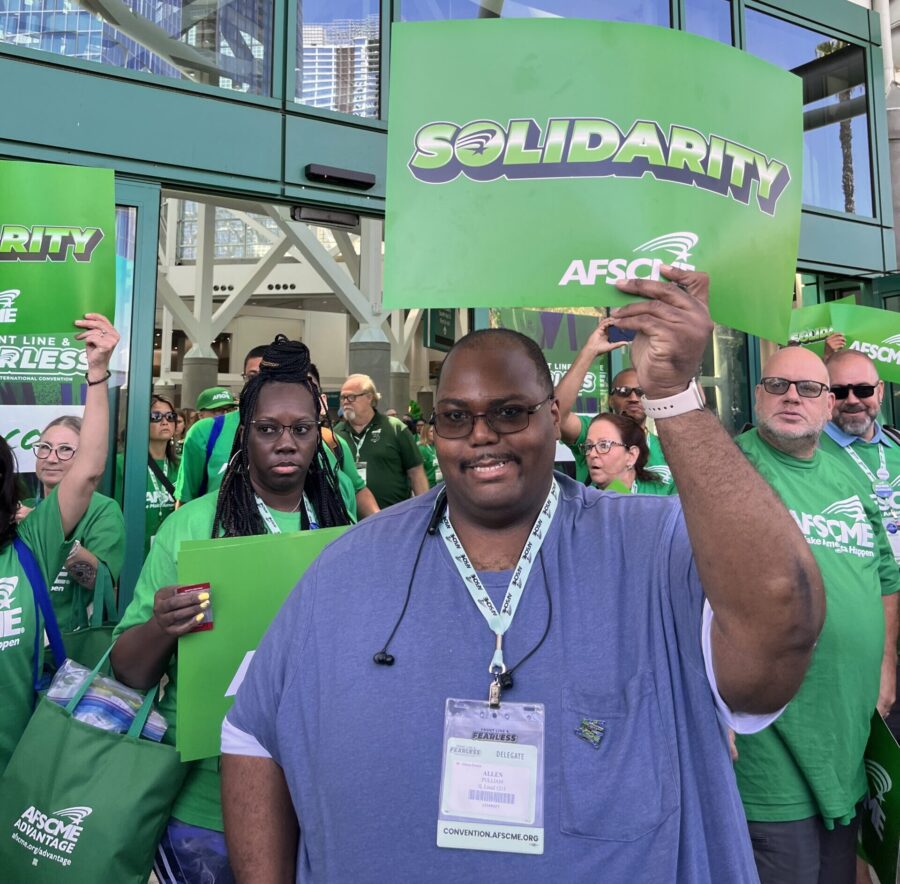
What AFSCME roles are elected at convention?
Emma: I was present for the reelection of our council IVPs, who ran unopposed. I missed the session where the international president and secretary-treasurer ran unopposed.
Adrienne: As Emma said, International Vice Presidents are elected from all the legislative districts that AFSCME is divided into. For Council 31, for example, after floor business ended for the day, we went to a separate room to caucus, and there the candidates for IVPs from our Council were nominated. It seems like many incumbent IVPs are re-nominated and re-elected year after year, and I’m curious to know more about how this impacts our union. Incumbents Lee Saunders, the International President, and Elissa McBride, International Secretary-Treasurer, also ran unopposed this year.
What role do caucuses play at convention?
Emma: There weren’t many caucuses at convention. I was only aware of two (climate change and conservative), and I wasn’t aware of their roles beyond having a meeting on the schedule. There was talk among members about forming caucuses in the future as a way to show the international board that the members are serious about certain issues.
Adrienne: Caucuses are a bit mysterious to me still. If I ever get to go to the convention again, I’d like to learn more about how they work and the advantages they give members who join together to form them. I was definitely impressed by the dedication of the climate change caucus members I met. They have been pushing AFSCME to fight for the environment and for workers struggling with the consequences of climate change for YEARS, and are pushing just as hard now as when they began. As we face ever-increasing carbon emissions and a very difficult future environmentally, their fight is more important than ever.
Convention offers a chance to meet and connect with folks from other locals and councils. What energy and ideas would you bring from these connections to our local?
Emma: Meeting people from other locals was my favorite part of the week. It was invigorating to work with members of Green4Falasteen to support their resolutions and talk about other issues we share, such as understaffing and democratization efforts.
Through our conversations, I’m more invested in increasing participation in our local, both personally and communally. One idea I’m really partial to is holding our monthly meetings at different times, perhaps on rotation. The most engaged members are used to Friday meetings, and I wouldn’t want to take those away completely, but if we want more people to participate, we have to accept that many people are unwilling or unable to give up their Friday nights. Having hybrid meetings helps increase accessibility; what other ways can we make meetings easier to attend? It was also incredible to meet a couple people from the retiree wing of AFSCME. Do CPL retirees have a way to participate in our cause?
Caroline: The Los Angeles Public Library union, the Librarians’ Guild, hosted a reception for cultural workers at their main library in downtown LA one evening after the convention. We were able to take guided tours of the main library with union staff before the library closed to the public and then enjoyed getting to meet and discuss concerns and common issues with other librarians and museum workers during the reception after the library closed. I would encourage more of our members to get involved in AFSCME’s Cultural Workers United campaign. While we are lucky to have a longtime, established union, we can provide support for other cultural workers who are fighting to be recognized or to get their first contracts.
Adrienne: I second Emma and Caroline’s ideas about increasing our support of CWU, exploring options to encourage participation in meetings and other actions from all of our members, and connecting with retirees.
Something that was especially inspiring to me was getting to meet members from across the country who share my desire to increase rank-and-file democracy in our union. We’ve all heard the slogan “The members ARE the union” – and I really believe it’s true! We’re most powerful when we lead from the bottom-up, fueled by rank-and-file self-direction. I discovered at convention that there are lots and lots of AFSCME members across the country who agree. So I’m excited to find new ways to encourage all Local 1215 members to embrace their power and help determine our Local’s–and AFSCME International’s–future.
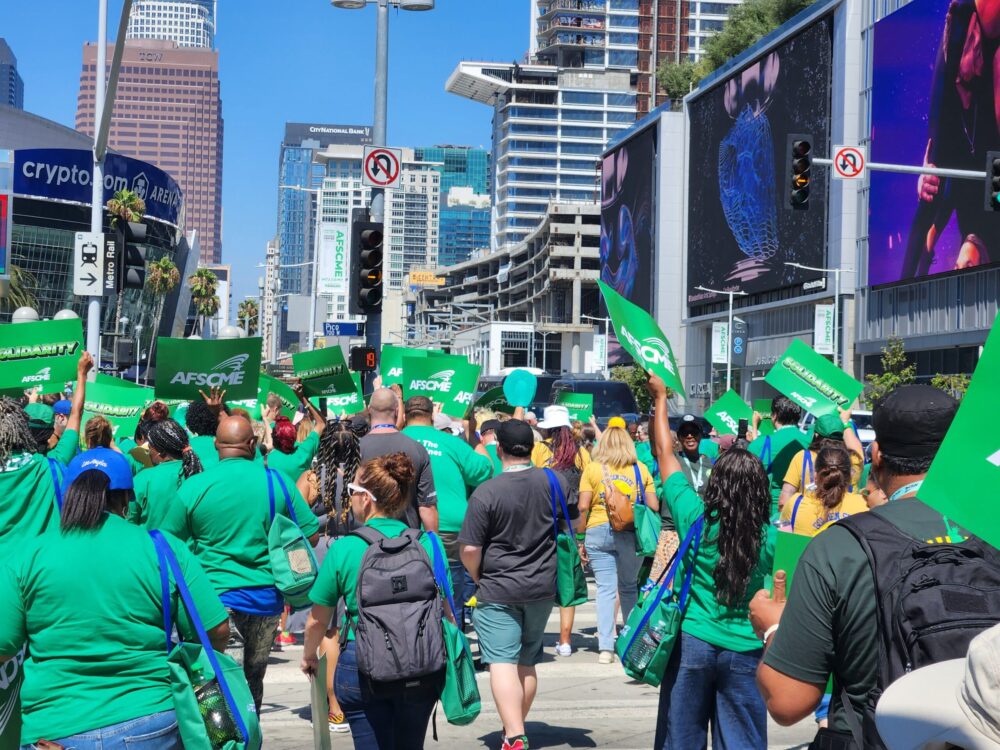
What types of supportive actions for local LA unions were you able to participate in? With the next convention taking place in Chicago, is there anything that inspired you for future action here?
Emma: I attended a rally in support of Local 3299. I would love it if our Local could support and encourage the creation and sustaining of new small locals, such as the one for Shedd Aquarium workers or the non-AFSCME one for Art Institute workers.
Caroline: The rally supporting Local 3299, which represents employees across the University of California system, was high energy and very necessary, as their members have been fighting for a fair contract that takes into account the unsustainable housing costs and infamously long commutes that keep some of their members living in their cars, hours away from their families in order to keep their jobs. I agree that taking action to support newly organized cultural unions in Chicago would be a great way for AFSCME to show up and really make a statement during the next convention.
Adrienne: The rally with Local 3299 was intense. I used to work as an adjunct, so it was especially inspiring to me to see the graduate student and adjunct workers firing up the crowd and rallying everyone around the fight for a sustainable life for educators in California’s public universities.
The next International Convention will be in 2026, which will be an important year of preparation and stress-testing for Local 1215 and Council 31 as we head into both our contract negotiations and the Mayoral election in 2027. We’ll need to be ready to advocate for ourselves, and for the well-being of all working people in our city in 2027. Connecting with AFSCME members from across the country is thrilling, and we can learn from everyone’s struggles, but I think the convention will also be a great forum for continuing to build and strengthen our connections and mutual solidarity with fellow AFSCME cultural and other workers right here in Chicago, so we can be ready to unite for fair contracts and for a fair deal for the entire working class in Chicago as a whole in 2027.

Comments